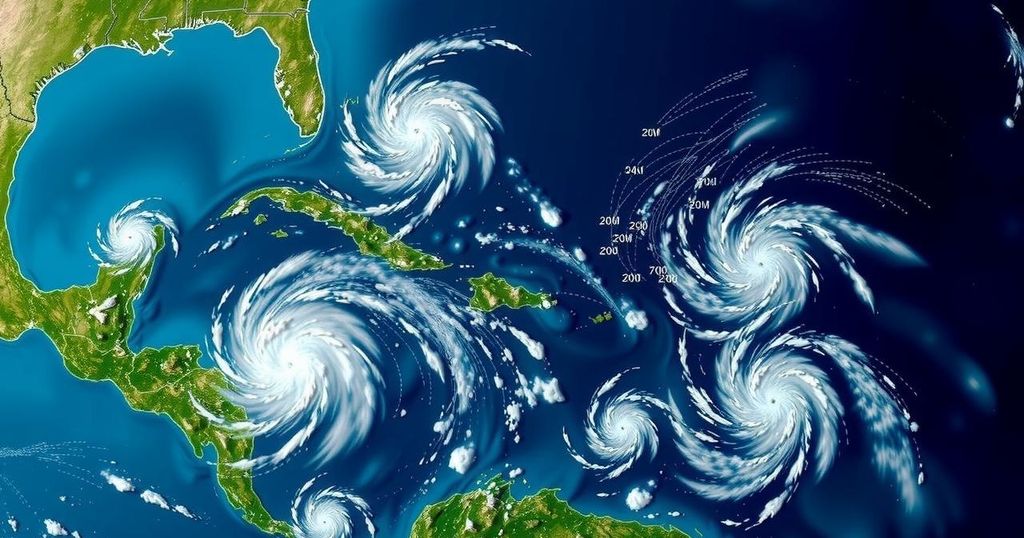Weather
World news
AFRICA, BE, CARIBBEAN, CLIMATE PREDICTION CENTER, CUBA, EVACUATIONS, FLORIDA, HURRICANE, HURRICANE BERYL, HURRICANE SEASON, MATTHEW ROSENCRANS, MICHAEL BRENNAN, NATIONAL HURRICANE CENTER, NATIONAL OCEANIC AND ATMOSPHERIC ADMINISTRATION, NATURAL DISASTERS, NOAA, NORTH AMERICA, RICK SPINRAD, UNITED STATES, WEATHER, WESTERN AFRICA
Fatima Khan
0 Comments
2024 Atlantic Hurricane Season Concludes with 18 Named Storms
The 2024 Atlantic hurricane season concluded with 18 named storms, including 11 hurricanes and five major hurricanes. NOAA indicated that this activity aligned with their August predictions. Significant storms included Hurricane Beryl, the earliest Category-5 hurricane recorded, and Hurricane Helene, which was forecasted as a major hurricane before becoming a tropical depression. The season highlighted advancements in forecasting technology and the critical role of NOAA in hurricane preparedness and response.
The 2024 Atlantic hurricane season, which concluded today, registered 18 named storms, including 11 hurricanes and five major hurricanes, according to the National Oceanic and Atmospheric Administration (NOAA). This marks significant activity for the season, which posed numerous operational challenges. Notably, five hurricanes made landfall in the continental United States, with two qualifying as major hurricanes. Despite the intensity, the overall storm activity aligned with NOAA’s predictions outlined in their August Hurricane Season Outlook, which anticipated an average of 14 named storms.
Matthew Rosencrans, lead hurricane forecaster at NOAA’s Climate Prediction Center, remarked, “The impactful and deadly 2024 hurricane season started off intensely, then relaxed a bit before roaring back,” citing a mid-season lull due to harsh conditions over Western Africa that impeded storm formation. Among the more significant events was Hurricane Beryl, which became the earliest Category-5 hurricane recorded in the Atlantic basin. In another unprecedented event, Hurricane Helene was forecasted by the National Hurricane Center as a major hurricane before it even transitioned from a tropical depression.
Administrator Rick Spinrad of NOAA emphasized the importance of scientific forecasting in weather prediction, stating, “As hurricanes and tropical cyclones continue to unleash deadly and destructive forces, it’s clear that NOAA’s critical science and services are needed more than ever by communities, decision makers and emergency planners.” Hurricane Milton notably featured rapid intensification, with wind speeds escalating by 90 miles per hour in just 24 hours, resulting in 46 tornadoes and substantial floods in Florida.
Dr. Michael Brennan, Director of NOAA’s National Hurricane Center, pointed to technological advances contributing to forecasting accuracy. Preliminary 2024 data indicates that the National Hurricane Center achieved the most precise track forecasts recorded to date at all lead times. Additionally, the Hurricane Hunter aircraft played a vital role in gathering data, conducting 392 mission hours and deploying over 1,246 scientific instruments.
Overall, the 2024 Atlantic hurricane season exceeded the standard averages but remained within the predicted storm activity ranges set forth by NOAA. In contrast, the Pacific hurricane season saw below-normal activity, with only 12 named storms in the eastern Pacific and just two in the central Pacific region.
Understanding the behavior and impact of hurricanes is critical for effective emergency planning and community safety. The Atlantic hurricane season runs annually from June 1 to November 30, during which regions are at risk for tropical storms and hurricanes. Monitoring seasonal activity is crucial because it involves analyzing patterns in storm development, intensity, and landfall impacts. NOAA, through its Climate Prediction Center and National Hurricane Center, provides critical forecasts and data to support preparedness and response efforts.
The conclusion of the 2024 Atlantic hurricane season reflects a season marked by both unprecedented activity and remarkable forecasting advancements. With 18 named storms exceeding the typical annual averages, the season revealed significant operational challenges and the importance of scientific forecasting in addressing hurricane-related impacts. As communities prepare for future seasons, robust forecasting and research efforts will be essential in mitigating risks associated with these powerful storms.
Original Source: caribbean.loopnews.com




Post Comment